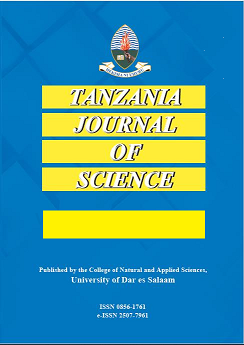Pathological scanning of ochratoxigenic moulds impaired feed in vivo, towards conceptualizing their reverberations on different organs
DOI:
https://doi.org/10.4314/tjs.v47i2.18Keywords:
Pathology, scanning, ochratoxigenic moulds, reverberationsAbstract
The role of ochratoxigenic moulds in causing several invasive diseases has been documented but little is known about the effects of these ochratoxigenic moulds contaminated feeds in a laboratory control experiment. This study therefore, examined the pathological effects of ochratoxigenic moulds contaminated feed in order to understand their reverberations on different organs. Thirty two albino rats were randomly assigned to four experimental treatments (T) with eight rats per treatment (T1, T2, T3 and T4). T1 and T2 were female and male control rats, respectively that were fed normal feed, while T3 and T4 were male and female experimental rats that were fed with ochratoxigenic moulds contaminated feed for a period of two weeks. Serum alanine aminotransferase (ALT), aspartate aminotransferase (AST), alkaline phosphate (ALP), acid phosphate (ACP), total protein, albumin and histopathological analysis of different organs, namely liver, heart, kidney, stomach, small intestine, lungs, brains and spleens were carried out following standard protocols. Results obtained depicted varying levels of serum concentrations of total protein, albumins, AST, ACP, ALT and ALP between treatments and control groups (p < 0.05). Photomicrograph examinations of the different organs examined reveal degenerative changes in the ultra-structural integrity of all the organs as compared to the control groups except for the spleen where there was no difference between the control and the treatment group.
Keywords: Pathology, scanning, ochratoxigenic moulds, reverberations


